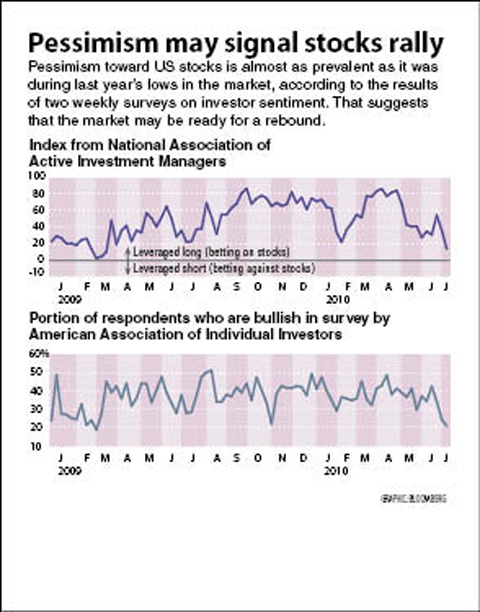US stocks chalked up their best weekly gains in a year as investors keep a close eye on the second quarter corporate earnings season beginning tomorrow.
With fears of a double-dip recession receding, the blue-chip Dow Jones Industrial Average jumped 5.3 percent during the holiday-shortened week to end Friday at 10,198.03.

The tech-rich NASDAQ composite index gained 5 percent over the week at 2,196.45 while the Standard & Poor’s 500 index, a broader measure of the market, was up 5.4 percent to 1,077.96.
The market received a fillip from news that the number of Americans registering for unemployment benefits declined and that the IMF increased its world growth forecast.
“The new notion after this week is that the double-dip recession may not come, or if it does that it won’t be a repeat of The Great Recession,” Jon Ogg of 27/7 Wall St said.
However, he cautioned that there were still risks in stocks and earnings, as key government and private indicators showed that recovery in the world’s largest economy was slowing.
“While many companies will talk about currency and healthcare and other charges impacting the net this year, it is the top-line and the stability of revenues and spending that are likely to take precedent,” Ogg said.
Many sectors were already down 10 to 20 percent since the start of the last earnings season, he said.
The stock rally “could suddenly end” if earnings data were “even slightly disappointing,” said Frederic Dickson, chief market strategist of DA Davidson & Co.
“Our view is that we may see companies deliver mixed results versus analysts’ expectations in the upcoming earnings reporting season, with the market possibly having to digest more disappointments than seen last quarter given the sudden pause in the economy that developed in May and early June,” he said.
Analysts at IHS Global Insight, however, painted a positive earnings outlook.
“The corporate earnings momentum overall should remain solid, especially the year-over-year comparisons,” they said in a note to clients.
There are also some signals that the loan charge-offs in the banking sector might be close to cresting, they said.
“That rite of passage for the banking sector, when it comes, will be a watershed for the current cyclical recovery,” the analysts said.
Generally, the economic tea leaves the coming week will point to a pending mid-cycle slowdown in growth, as last month’s retail sales and industrial production are expected to peel back, the analysts said. Traders will also be closely monitoring the US Federal Reserve’s release on Wednesday of the minutes from last month’s meeting of its policy-making body.
There were no changes to interest rates at the meeting, but the Fed downgraded its assessment of the economy stating that financial market conditions were “less supportive” of economic growth amid the debt crisis in Europe, analysts at Charles Schwab & Co said.
As stocks jumped the past week, bonds plunged. The yield on the 10-year Treasury bond rose to 3.056 percent from 2.979 percent last week while that on the 30-year bond climbed to 4.040 percent from 3.941 previously. Bond prices and yields move in opposite directions.

STILL COMMITTED: The US opposes any forced change to the ‘status quo’ in the Strait, but also does not seek conflict, US Secretary of State Marco Rubio said US President Donald Trump’s administration released US$5.3 billion in previously frozen foreign aid, including US$870 million in security exemptions for programs in Taiwan, a list of exemptions reviewed by Reuters showed. Trump ordered a 90-day pause on foreign aid shortly after taking office on Jan. 20, halting funding for everything from programs that fight starvation and deadly diseases to providing shelters for millions of displaced people across the globe. US Secretary of State Marco Rubio, who has said that all foreign assistance must align with Trump’s “America First” priorities, issued waivers late last month on military aid to Israel and Egypt, the

‘UNITED FRONT’ FRONTS: Barring contact with Huaqiao and Jinan universities is needed to stop China targeting Taiwanese students, the education minister said Taiwan has blacklisted two Chinese universities from conducting academic exchange programs in the nation after reports that the institutes are arms of Beijing’s United Front Work Department, Minister of Education Cheng Ying-yao (鄭英耀) said in an exclusive interview with the Chinese-language Liberty Times (the Taipei Times’ sister paper) published yesterday. China’s Huaqiao University in Xiamen and Quanzhou, as well as Jinan University in Guangzhou, which have 600 and 1,500 Taiwanese on their rolls respectively, are under direct control of the Chinese government’s political warfare branch, Cheng said, citing reports by national security officials. A comprehensive ban on Taiwanese institutions collaborating or

France’s nuclear-powered aircraft carrier and accompanying warships were in the Philippines yesterday after holding combat drills with Philippine forces in the disputed South China Sea in a show of firepower that would likely antagonize China. The Charles de Gaulle on Friday docked at Subic Bay, a former US naval base northwest of Manila, for a break after more than two months of deployment in the Indo-Pacific region. The French carrier engaged with security allies for contingency readiness and to promote regional security, including with Philippine forces, navy ships and fighter jets. They held anti-submarine warfare drills and aerial combat training on Friday in

COMBAT READINESS: The military is reviewing weaponry, personnel resources, and mobilization and recovery forces to adjust defense strategies, the defense minister said The military has released a photograph of Minister of National Defense Wellington Koo (顧立雄) appearing to sit beside a US general during the annual Han Kuang military exercises on Friday last week in a historic first. In the photo, Koo, who was presiding over the drills with high-level officers, appears to be sitting next to US Marine Corps Major General Jay Bargeron, the director of strategic planning and policy of the US Indo-Pacific Command, although only Bargeron’s name tag is visible in the seat as “J5 Maj General.” It is the first time the military has released a photo of an active